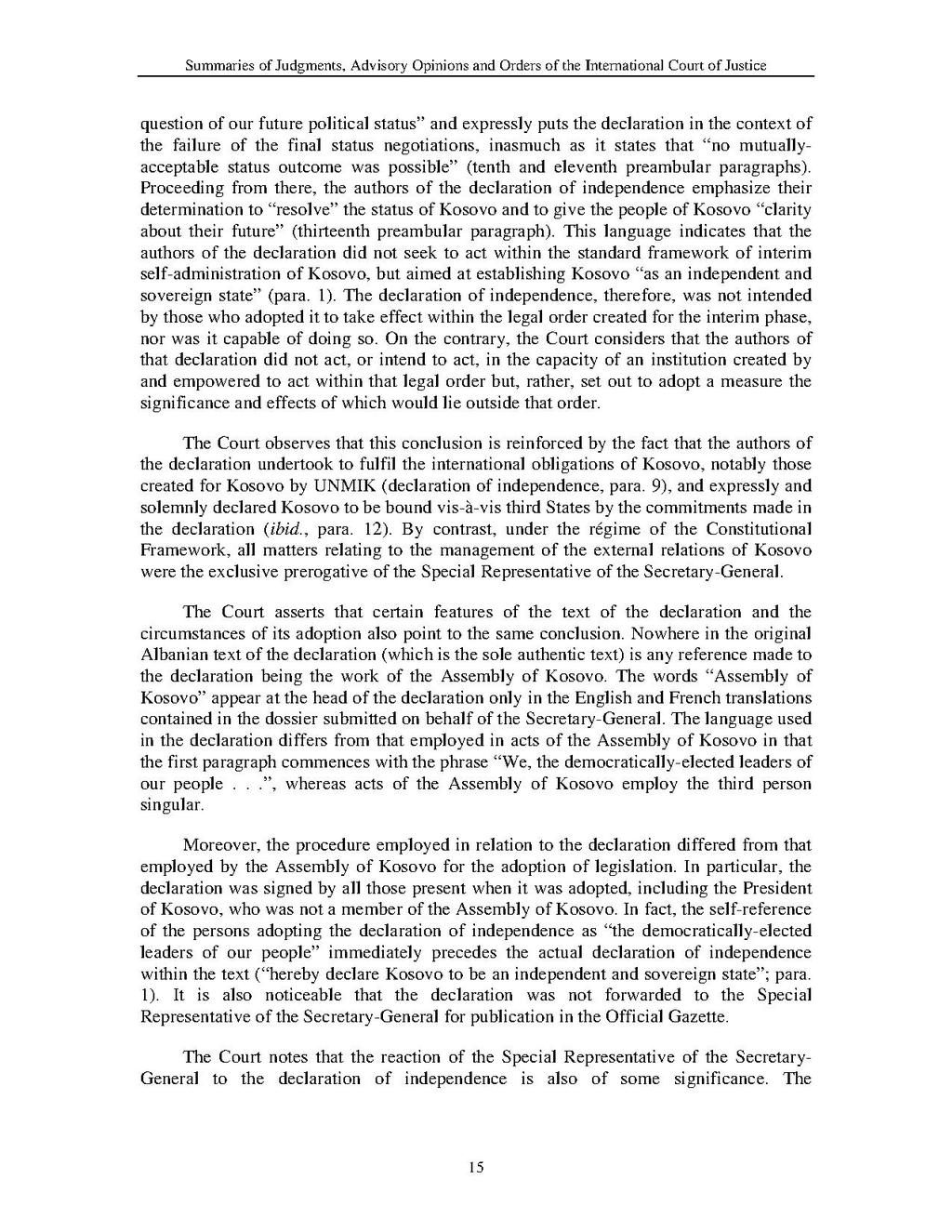Summaries of Judgments, Advisory Opinions and Orders of the International Court of Justice
question of our future political status" and expressly puts the declaration in the context of the failure of the final status negotiations, inasmuch as it states that "no mutuallyacceptable status outcome was possible" (tenth and eleventh preambular paragraphs). Proceeding from there, the authors of the declaration of independence emphasize their determination to "resolve" the status of Kosovo and to give the people of Kosovo "clarity about their future" (thirteenth preambular paragraph). This language indicates that the authors of the declaration did not seek to act within the standard framework of interim self-administration of Kosovo, but aimed at establishing Kosovo "as an independent and sovereign state" (para. 1). The declaration of independence, therefore, was not intended by those who adopted it to take effect within the legal order created for the interim phase, nor was it capable of doing so. On the contrary, the Court considers that the authors of that declaration did not act, or intend to act, in the capacity of an institution created by and empowered to act within that legal order but, rather, set out to adopt a measure the significance and effects of which would lie outside that order.
The Court observes that this conclusion is reinforced by the fact that the authors of the declaration undertook to fulfil the international obligations of Kosovo, notably those created for Kosovo by UNMIK (declaration of independence, para. 9), and expressly and solemnly declared Kosovo to be bound vis-à-vis third States by the commitments made in the declaration (ibid., para. 12). By contrast, under the régime of the Constitutional Framework, all matters relating to the management of the external relations of Kosovo were the exclusive prerogative of the Special Representative of the Secretary-General.
The Court asserts that certain features of the text of the declaration and the circumstances of its adoption also point to the same conclusion. Nowhere in the original Albanian text of the declaration (which is the sole authentic text) is any reference made to the declaration being the work of the Assembly of Kosovo. The words "Assembly of Kosovo" appear at the head of the declaration only in the English and French translations contained in the dossier submitted on behalf of the Secretary-General. The language used in the declaration differs from that employed in acts of the Assembly of Kosovo in that the first paragraph commences with the phrase "We, the democratically-elected leaders of our people…", whereas acts of the Assembly of Kosovo employ the third person singular.
Moreover, the procedure employed in relation to the declaration differed from that employed by the Assembly of Kosovo for the adoption of legislation. In particular, the declaration was signed by all those present when it was adopted, including the President of Kosovo, who was not a member of the Assembly of Kosovo. In fact, the self-reference of the persons adopting the declaration of independence as "the democratically-elected leaders of our people" immediately precedes the actual declaration of independence within the text ("hereby declare Kosovo to be an independent and sovereign state"; para. 1). It is also noticeable that the declaration was not forwarded to the Special Representative of the Secretary-General for publication in the Official Gazette.
The Court notes that the reaction of the Special Representative of the Secretary General to the declaration of independence is also of some significance. The
15
